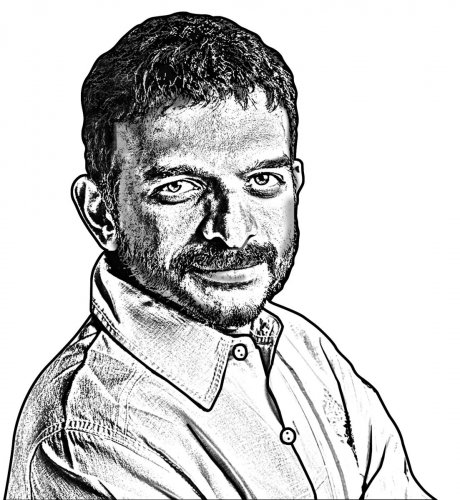
T M Krishna
As much as Narendra Modi’s every word is savoured and actions admired by his followers, the emotions he triggers in his critics are diametrically opposite. Watching him speak or even take a stride evokes intense negativity. Other than the obvious ideological opposition and historical reasons, there are many other perceived qualities that generate dislike. In him we see a dictatorial, unsympathetic, overpowering individual. Someone who does not seem to listen or care, who does whatever he wants to achieve his goal, irrespective of its consequences. For the moment, let us keep the ideological standpoint aside and look at other things about him that bother us.
From time immemorial, tales, myths and social conversations have all pointed to certain characteristics of a leader. Even management books and leadership guides espouse similar qualities. Some of the often-used words and phrases in association with leadership include: firm, strong, decision-maker, unsentimental, courageous, must command respect, must inspire confidence, a striking presence and body language. It is possible to understand these expressions in many different ways, but all of us but all of us instinctively comprehend their undeclared inferences.
In fact, I am certain that, as you read those words, you saw a certain kind of person in your mind’s eye. Unfortunately, it would have most likely been a man! Within the Indian context, many of these characteristics are closely tied to gender, caste, cultural and class privilege. An imitation of these qualities is considered leadership. This is established and emerges from India’s deep-rooted feudal construct.construct. We are told that being sensitive and caring are important, but those qualities need to be kept in check because hard choices have to be made and we need to “progress”. Often, the idea of a ‘greater good’ is flaunted. Each of these excuses are levers of power.
I am raising this question because I wonder if we liberals will be fine with, or turn a blind eye to, a non-right-wing Narendra Modi? Life is cyclical and Prime Ministers come and go, but unless we investigate ingrained ‘leadership’ absolutisms, we will only replace one supremo with another. Look at how we treated Manmohan Singh when he was Prime Minister. His walk, talk and appearance did not match our cliched perceptions of a leader. Even if his actions worked, credit was always attributed elsewhere. Now, in retrospect, we express gratitude. Singh himself said in 2014, “History will be kinder to me…”
In contrast, today’s Prime Minister is complimented for anything and everything. This happens because he speaks, walks, talks like what we believe a leader should be! Actually, he generates fear, and we want a leader to be feared. In our dictionary, fear and respect are synonyms. Liberals are unable to call out Indira Gandhi as a deeply problematic leader because she, too, fits the bill. If ‘if’ and ‘but’ explanations are brought forward for her, then similar ones are given by the other side for someone like Modi. They are both stereotypical leaders; which one we celebrate depends on our respective socio-political leanings.
At a private gathering, many supporters of another political party complained that the very qualities that I find problematic are strikingly evident in their party leader as well. But they had not heard me speak of it. They were right. Of course, all us are negotiating these political spaces, but the fact that dictatorship does not bother us as long as it is on our side of the green needs addressing.
But we cannot begin at the top. Our homes and schools are built on these tropes. The social order is clearly demarcated, and everyone plays by those rules. The strong father is the head of the house, the mother is the feminine caregiver. She does everything to ensure that the leader is successful. There is, of course, the unacceptable saying “Behind every man’s success, there is a woman.” Women and people from marginalised communities have to imitate this normalised, unilateral style of leadership if they want any kind of respect from the dominant.
Parents tutor children, especially boys, to be ‘cutthroat’ and ‘driven’. Schools worsen the situation. Principals and teachers segregate children on the basis of these qualities, and this also means casteism is at play. Some students are called ‘achievers’ and paraded on the stage as examples to emulate. The others who are not ‘that type’ watch with awe and fear, hoping that someday, they too can look, speak and behave like the on-stage stars. The entire examination process and workplace environments feed into this ‘success’ psychosis. These qualities are the very same that people admire in Modi.
Children who want to rest and not push themselves so hard are considered mediocre under-achievers and told they can never be leaders. How many times have we heard people speak of how Modi works “24 hours of the day”! Whether it is true or not is irrelevant. But I am certain many in the younger generation are told, “You want to be like Modi-ji, you have to work 24 hours.” The impact of such inanity is not just on our social and political choices; it hurts our society’s psychological health. Depression, emotional distress, and suicides are seen across our societal landscape.
Readers may wonder how a piece that seemed utterly political in the beginning transformed into a commentary on our behavioural patterns. But aren’t the two ntimately connected? The leader image did not come from a vacuum. It was constructed by tapping into common thinking and strategically exaggerating certain aspects that mesmerize us. Our political choices will shift only when our homes, schools and workplaces metamorphosize.
(T M Krishna: the mind questions, the music moves, the mountains beckon)
This article was originally published on the Deccan Herald website on August 28, 2022. Republished with permission from the author. https://www.deccanherald.com/opinion/if-not-modi-who-do-we-liberals-want-ah-one-like-him-from-our-side-of-the-patch-1139970.html

In this deeply provocative article, Krishna starts by asking the ‘liberal’ reader to turn the lens inward. He provokes by pointing out the universality of what we all, irrespective of our political affiliations or ideologies, seem to seek in a leader. One may call it definitiveness, decisiveness but in practice, it is an authoritarian masculine figure. In fact, Piloo Mody reportedly said of Indira Gandhi that she was the ‘only man in her cabinet.’ But what is important to examine a little more is what has contributed to the social construct of success and achievement that Krishna talks about in his article. Why are such ‘leaders’ (Right, Left or Centre) able to systematically and consistently have so many of under their spell? Some have argued that it is capitalism and economic liberalisation which has led to this idea of ‘success’ and the individual-first attitude which has spilt over to the kind of leaders we seek. Globally we have been witnessing the emergence and dominance of authoritarian figures as heads of state and being elected ‘democratically’ with elections being bought and shaped by capital. So it is not just India. A sign of times, it is argued.
Is there something more fundamental that we need to look at here? We allow one person or a small group to make decisions that strip people of their dignity, lives and livelihoods; disrespect all life forms & compromise our ability to reason. What lets liberals, make excuses for ‘one of our own,’ to be authoritarian? Is it the need for certainty in a seemingly more uncertain world? Uncertainty of any kind or holding an opinion or thought tentatively seems to be seen as a sign of weakness. We saw this in the way scientists were criticised during the pandemic or how climate deniers ‘mock’ the falsifiability of science or as Krishna describes how Manmohan Singh was perceived. A decisive, authoritarian figure seems to offer certainty, albeit an illusory one, successfully and more importantly builds a narrative that nobody else can. And so the juggernaut of authoritarianism rolls on.
Let us for a minute take forward Krishna’s argument that “Our political choices will shift only when our homes, schools and workplaces metamorphosize.” This will require introspection and reflection to first understand and then acknowledge where we are, why we are here, and how did we get here. Possibly then think critically about ways to bring about a transformation – at the individual level which is essential to bring about any collective change. Education, not the kind that is in enclosed spaces and builds closed conditioned minds, but one that encourages and nurtures real learning, holds the possibility to enable this. The kind of learning that builds respect, care and compassion for all peoples irrespective of their identity, for all life forms and most importantly for the land that nurtures us.
Another perspective that might help us take this conversation forward on how we can “metamorphosize” our personal and collective spaces, is Shiv Vishvanathan’s article on ethics and democracy (https://www.newindianexpress.com/opinions/2022/dec/15/ethics-is-one-illiteracy-that-democracy-must-focus-on-now-2528193.html). When he says “Ethics is one illiteracy that democracy must focus on now” there is an urgency and at the same time an “invitation” to imagine and create momentum around this idea.